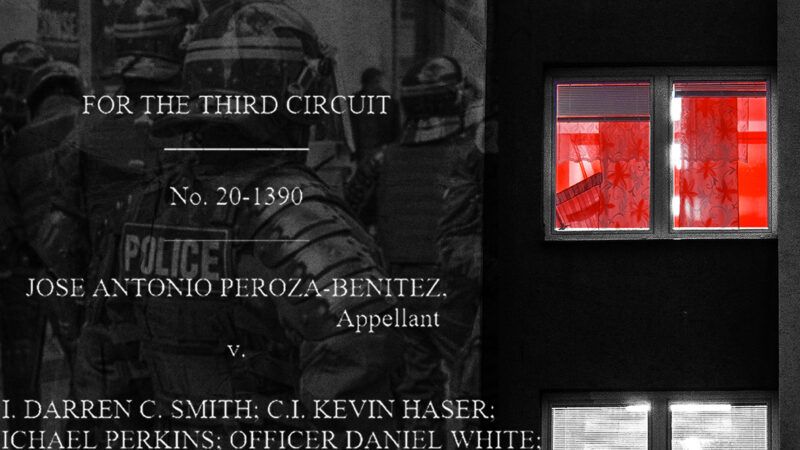Cops Punched a Man Hanging From a Window and Tased Him After He Fell. They Got Qualified Immunity.
But the appeals court wasn't having it.

Jose Peroza-Benitez was asleep in his Pennsylvania apartment when the police broke through his door, executing a warrant for a drug raid. Startled, he fled. The officers went on to chase him through the neighborhood, into an abandoned building, and out a window. As Peroza-Benitez dangled from the ledge, one cop punched him in the head, allegedly causing him to fall to the concrete. Another officer then reportedly tased him as he lay on the ground.
Those cops—Kevin Haser of the Drug Enforcement Administration and Daniel White of Reading Police Department, respectively—were originally awarded qualified immunity, the legal doctrine that shields government officials from federal civil rights suits if the specific way they violated your constitutional rights has not yet found its way into a court precedent. In other words, a jury of Peroza-Benitez's peers could not decide if damages were appropriate for the surgeries he received to address a broken leg and arm injuries.
In April, a federal court categorically rejected that argument. It was already "clearly established," it said, that state actors may not beat an unarmed man hanging from a building and then tase him when he is unconscious.
"Here, Peroza-Benitez was unarmed, injured, covered in his own blood, and hanging from a second-story window by his hands, feet dangling, when [Criminal Investigator] Haser—knowing Peroza-Benitez to be unarmed—punched him 'repeatedly' in the head with a closed fist," wrote Circuit Judge Luis Felipe Restrepo of the U.S. Court of Appeals for the 3rd Circuit. Prior court rulings explicitly note that it is unconstitutional for police to "tase an individual who is positioned on an elevated surface at a height that carries with it a risk of serious injury or death, causing the individual to fall."
As a testament to how granular qualified immunity can be, Haser responded that he opted to punch the suspect instead of tasing the suspect. The court declined to indulge that distinction. But qualified immunity cases often turn on minute factual differences. Consider the group of prison guards who were originally awarded qualified immunity for locking a naked inmate in two filthy cells—one covered in "massive amounts" of human feces, the other with a sewage leak bubbling up on the floor—because the exact amount of time the man lived in those cells had not been etched out in pre-existing case law.
The 3rd Circuit similarly reversed Officer White's grant of qualified immunity. "There is a 'robust consensus of cases' that support the proposition that tasing a visibly unconscious person—who just fell over ten feet onto concrete—is a violation of that person's Fourth Amendment rights," noted Restrepo.
It is entirely possible that a jury will refuse to give Peroza-Benitez any damages whatsoever. There are disputes between the various officers' accounts and Peroza-Benitez's telling. Officer Michael Perkins, who was also on the scene, testified that the suspect "made a [lunging] motion like he was going to start running again" after he fell two stories, hitting a porch railing, and landing on the concrete stairwell. White says that Peroza-Benitez merely started to "sit forward." Peroza-Benitez says he was briefly knocked unconscious. All concede that he was "tased either immediately or almost immediately upon landing."
The important thing is that jurors will decide whether such force was justified. That's their role. It is not the role of a few bigwigs on the judiciary. The Founders "viewed citizen juries as indispensable to the civic life of a liberal democracy," Clark Neily, senior vice president for legal studies at the Cato Institute, told me last month. "The extent to which judges have almost completely marginalized [that], I think, is one of the most remarkable, and yet unremarked, developments of the modern judiciary." This time, the court agreed with the Founders' principle.
